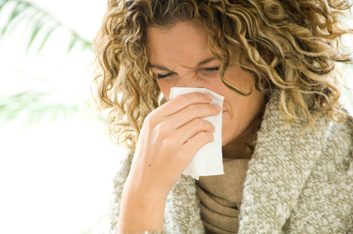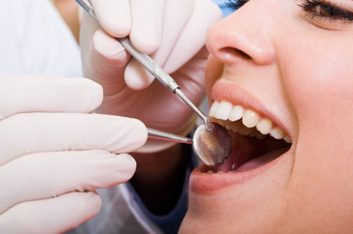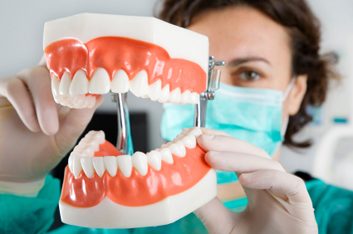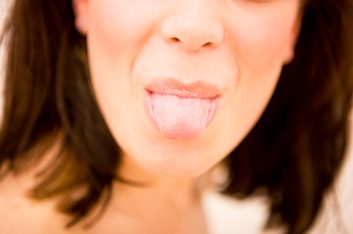
Oral hygiene
Maintaining good oral health is essential in reducing bad breath. If you don’t brush and floss regularly, harmful bacteria can attack tooth enamel, which will lead to tooth decay. Make sure you replace your toothbrush every few months, since a number of microorganisms can live in your toothbrush and infect your mouth. Visit your dentist for regularly scheduled cleanings to help keep plaque build-up to a minimum. For most people, the Canadian Dental Association recommends a check up every six months, but your dentist may suggest that you visit more or less often depending on how well you clean your teeth.

Morning breath
Waking up with morning breath can leave your mouth feeling dry and grimy. While you sleep, your saliva production slows down and odour-causing bacteria begin to breed, leaving you with the kiss of death when you wake up. Brushing and flossing your teeth before bed will help keep your mouth clean during the night. Since saliva acts as a natural mouthwash, try to breathe through your nose to prevent your saliva from drying up. The best way to rid your mouth of foul morning breath is to get up and brush your teeth.

Foods you’ve eaten
Food you eat affects the air you exhale, especially foods with strong aromatic flavours like onions and garlic. Enzymes found in saliva start the digestion process as soon as you start chewing food, but once the food is absorbed into the bloodstream, it’s transferred into the lungs and you breathe it out. Brushing, rinsing with mouthwash or sucking on a breath mint only help to mask these foul odours. Avoiding certain types of food like meat, sugar, high-fat and spicy foods, and dairy products can help eliminate bad breath.

Sinus infection and allergies
Odour-causing bacteria are attracted to the proteins in mucous and phlegm. When you have a sinus infection, head cold or allergies, your sinuses will produce more mucous. As the extra mucous trickles down the back of your throat you’ll notice your breath is a bit fouler than usual.

Gum Disease
Periodontal disease, also known as gum disease, is a bacterial infection in the tissue surrounding the teeth. People who suffer from gum disease are more prone to persistent bad breath because of the buildup of bacteria. If you can’t get rid of your bad breath by brushing and flossing every day, the Canadian Dental Association encourages visiting your dentist to determine if you have gum disease.

Dry mouth
Dry mouth, or xerostomia, occurs when the flow of saliva decreases in your mouth. Saliva is the body’s natural method of cleansing the mouth and removing food particles. According to the American Dental Association, medical conditions such as salivary gland problems or continuously breathing through your mouth can lead to bad breath. Chewing sugarless gum makes you salivate which will help wash away bacteria in your mouth leaving your breath minty fresh.

Smoking
Not only does smoking leave behind the tell-tale ashtray odour, the smoke actually affects the flow of saliva in the mouth, which causes dry mouth. Harmful chemicals found in cigarettes can also cause bad breath, but according to the Canadian Dental Association, smoking can also cause heart disease and a variety of cancers, including oral cancer.

Untreated medical conditions
Persistent bad breath can be a sign of other serious health problems such as a respiratory tract infection, chronic sinusitis, postnasal drip, chronic bronchitis, diabetes and gastrointestinal disorder. If your dentist determines your mouth is healthy, you may be referred to your family doctor to determine other sources of the odour.

Dentures
Good oral hygiene practices apply to dentures, just like natural teeth. Food particles and bacteria can find a home in the spaces between the denture and the gum tissue. As bacteria grow and food breaks down, an unpleasant odour will be released. Removing dentures to clean after each meal and gently brushing the gums will help eliminate odour-causing bacteria. According to the Canadian Dental Association, visiting your dentist regularly to ensure your gums are health is very important.

Tongue
Your tongue is one of the most common causes of bad breath. The “fur” on your tongue acts like a shag carpet where food particles, bacteria and post-nasal drip can accumulate, creating the ideal conditions for bacteria to breed. A toothbrush isn’t the best tool to use to clean your tongue because it’s designed to clean your teeth. A tongue cleaner or tongue scraper is an oral-hygiene device designed to clean the sludge that collects on the surface of your tongue. Cleaning your tongue regularly can make a huge difference in the quality of your breath.
Related:
• Natural home remedies: Bad breath
• How to tell if you have bad breath
• 7 things your mouth is trying to tell you
